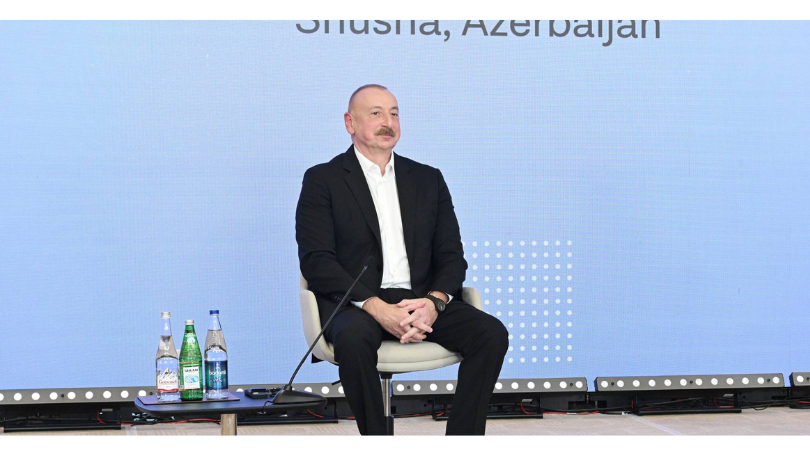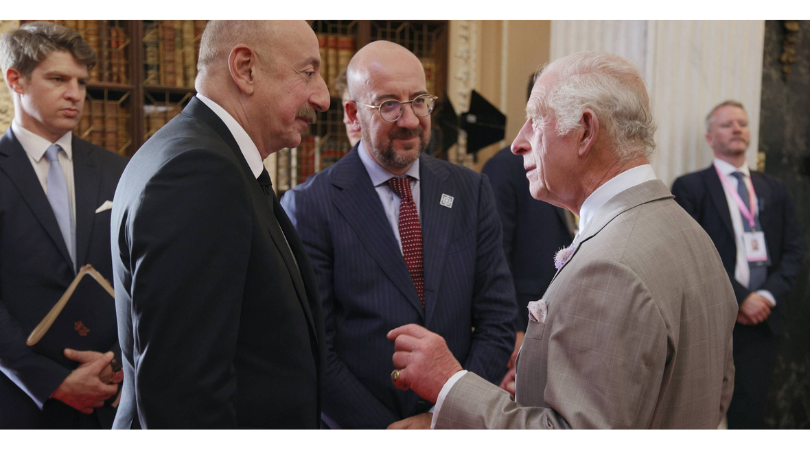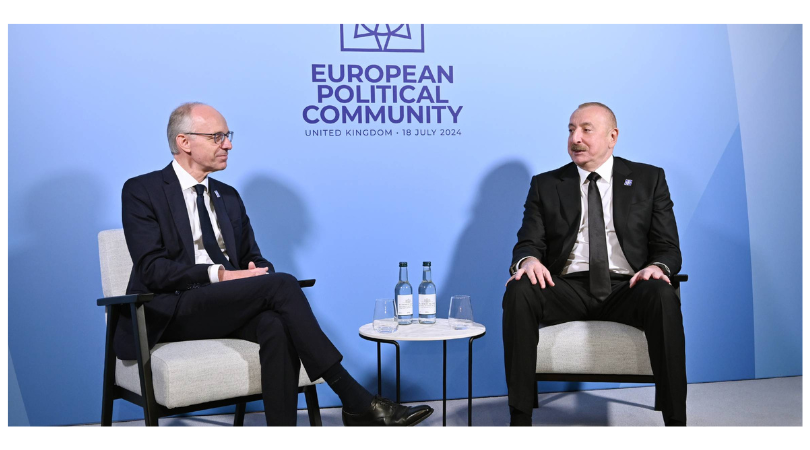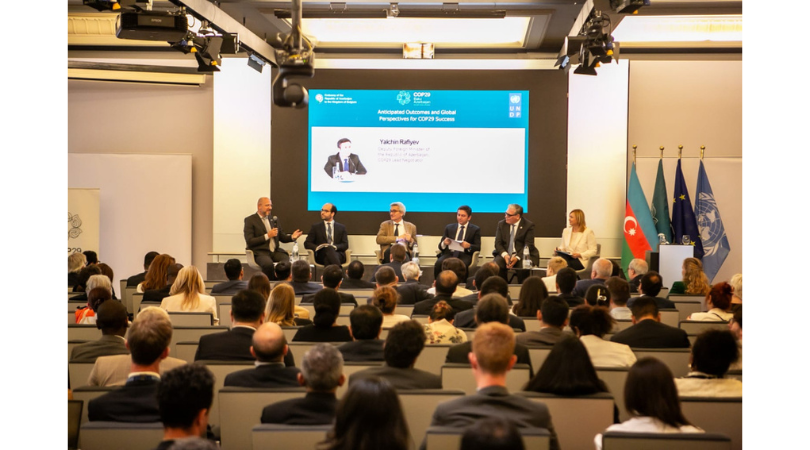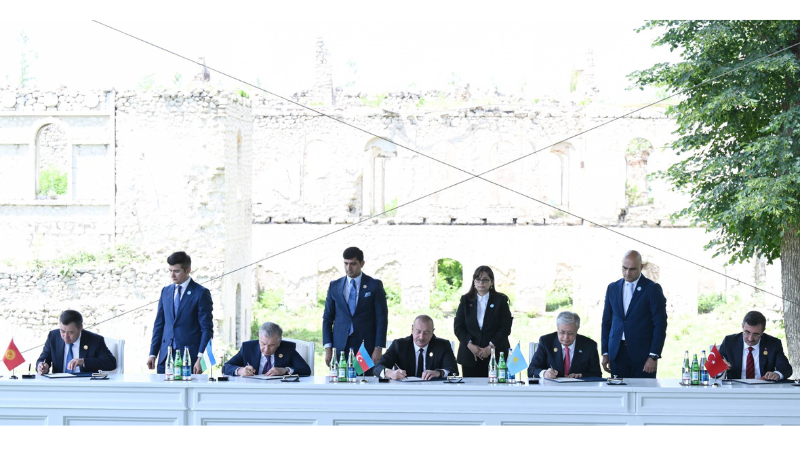International Conference titled 'Azerbaijan–Belgium: Co-operation in Energy and Beyond' takes place in Brussels
On 10 March 2015, the current and future role of Azerbaijan as an energy supplier and transit country was highlighted at the landmark Azerbaijan–Belgium: Co-operation in Energy and Beyond international conference – jointly organised by leading Belgian energy infrastructure specialist Fluxys and The European Azerbaijan Society (TEAS). The event was appropriately hosted at the 18th century Château of Val-Duchesse, which hosted the conferences that led to the creation of the European Economic Community (forerunner of the European Union) in 1957. More than 120 specially invited diplomats, ministers, Belgian politicians and businesspeople attended the event.
In December 2013 the $45bn final investment decision (FID) on the Southern Energy Corridor was signed between the BP-led Shah Deniz Consortium and the Azerbaijani government, which will see Azerbaijani Caspian gas brought from the Shah Deniz 2 field to Europe, delivering energy to Turkey, Greece, Italy and Bulgaria. Groundbreaking took place at the Sangachal Terminal in September 2014, and it is expected that the first gas will arrive in Turkey in 2020. The gas will pass through the South Caucasus Pipeline expansion (SCPX), the Trans-Anatolian Pipeline (TANAP) and the Trans-Adriatic Pipeline (TAP).
Marc Verwilghen, Director, Brussels Office, The European Azerbaijan Society (TEAS), and former Belgian Energy Minister, introduced the event, saying: “The creation of a pipeline system carrying Azerbaijani hydrocarbon resources to Europe, via Turkey, began a decade ago, breaking the Russian monopoly over the exporting of Caspian energy resources and providing Europe with an important source of diversification.
“It was timely to organise this event to remind Europe that the Southern Gas Corridor should be steered at the highest political level in Europe and Belgium, in addition to Azerbaijan. The importance of this strategy cannot be underestimated.”
Didier Reynders, Belgian Deputy Prime Minister and Minister of Foreign Affairs, continued: “I hope this conference will provide new opportunities to increase the level of our vital trade and investment. Two Belgian delegations are to visit Baku in April – one is trade focused, and I will lead the other as Chair of the Committee of Ministers of the Council of Europe. Bilateral relations between Belgium and Azerbaijan are in excellent shape – numerous Belgian companies are currently active in Azerbaijan, including those in the construction, healthcare and solar energy sectors.
“Belgium’s premier gas infrastructure specialist Fluxys – co-organiser of today’s event – recently increased its stake in TAP from 16 to 19 per cent. This massive project will bring Azerbaijani gas to European markets, and change the energy landscape across the continent. Fluxys is collaborating very closely with the State Oil Company of the Azerbaijani Republic (SOCAR). Fluxys is now offering its gas transit services to its Greek counterpart, DESFA, so its role in this essential project will further increase. There are opportunities for Belgian companies in the areas of energy, energy storage, energy efficiency, renewable energy and water distribution. Belgium can also supply such services as dredging, in which it is a world specialist. In 2013 Belgian–Azerbaijani bilateral trade amounted to 51.7m compared to 33.7m in 2009.
“Azerbaijan held the Chairmanship of the Committee of Ministers of the Council of Europe before the current Belgian presidency. I will visit Baku as Chairman of the Committee of Ministers, and in the lead up to the EU Eastern Partnership Summit in Riga, we will assess how we can increase our collective co-operation with Azerbaijan.”
Natig Aliyev, Azerbaijani Minister of Energy, recalled: “Such successful EU–Azerbaijani energy projects as the Baku–Tbilisi–Ceyhan (BTC) oil and Baku–Tbilisi– Erzurum (BTE) gas pipelines have already demonstrated the role of Azerbaijan in ensuring energy security. The joint EU–Azerbaijani declaration on the Southern Gas Corridor was signed in Baku in 2011, recognising Azerbaijan as a substantial contributor to and enabler of the Corridor, with a significant role in providing a new source of gas to Europe.
“This led to the signing of the agreements concerning TAP and TANAP, and the first meeting of the Southern Gas Corridor Advisory Council in Baku took place earlier this year. The EU, many financial institutions and all partners have reconfirmed their commitment to the Southern Gas Corridor. The project requires the drilling of 26 subsea wells, construction of a new refinery in Sanganchal and development of the SPCX to increase its capacity. Around 25 per cent of the Southern Corridor is completed and first gas will come to Europe by 2020.”
Stephen Gallogly, Head: Europe, Middle East and Africa Division, International Energy Agency, commented: “The distance between Brussels and Baku is over 3500km, but in energy terms this is insignificant. Azerbaijani hydrocarbon developments will impact European energy security, including that of Belgium. It is now the turn of natural gas to add another success to Azerbaijan’s energy development. The Southern Gas Corridor will help diversify sources of energy for Europe, away from Russian dominance. Azerbaijan’s contribution to the Southern Gas Corridor is essential.
“By 2020, coal-fired power stations will be decommissioned across Europe, as will most nuclear power stations. There will be a greater requirement for gas imports, and the Southern Gas Corridor is designed to potentially carry gas from Eastern Europe, the Mediterranean, Central Asia, Iraq and Iran, amongst other countries.
“However, the first gas will be Azerbaijani, and the groundbreaking project for the TANAP project will take place in Kars, Turkey, next week, attended by Turkish President Racep Tayyip Erdogan and Azerbaijani President Ilham Aliyev.”
Walter Peeraer, CEO, Fluxys, outlined: “Fluxys builds and operates the infrastructure carrying energy from the producer to the user-market, and has been at the crossroads of international gas flows in Belgium for decades. Azerbaijani gas will be the new complementary source for Europe. I appreciate the current and future potential of Azerbaijan in ensuring the energy security of Europe. Our partnership in TAP is for the long-term, and a transmission operator we are sharing our expertise and bringing value to the project.”
Murad Heydarov, Advisor to the President, SOCAR, concluded: “The Southern Gas Corridor brings together many stakeholders and players. The meeting of the Southern Gas Corridor Advisory Panel indicates this level of co-operation, and its objective is to reduce excessive bureaucracy and provide a real framework for practical implementation. There were direct references to Azerbaijan in the Final Framework Paper of the EU Energy Union, published two weeks ago. The EU new framework document indicates Azerbaijan as a strategic partner. The Southern Gas Corridor is a practical response to existing challenges regarding EU energy security.”
The event ended with a lively question-and-answer and networking opportunity, accompanied by the duo of leading Azerbaijani violinist Sabina Rakcheyeva and pianist Ricardo Gosalbo.

